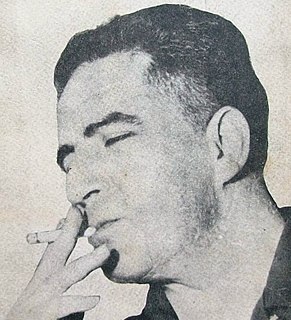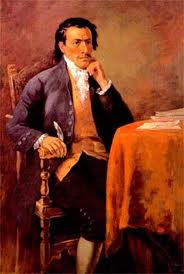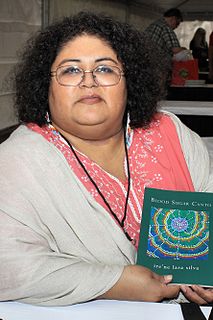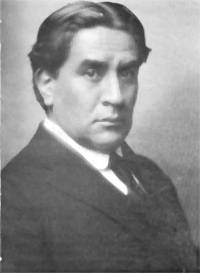 W
WCiro Alegría Bazán was a Peruvian journalist, politician, and novelist.
 W
WGloria Evangelina Anzaldúa was an American scholar of Chicana cultural theory, feminist theory, and queer theory. She loosely based her best-known book, Borderlands/La Frontera: The New Mestiza, on her life growing up on the Mexico–Texas border and incorporated her lifelong experiences of social and cultural marginalization into her work. She also developed theories about the marginal, in-between, and mixed cultures that develop along borders, including on the concepts of Nepantla, Coyoxaulqui imperative, new tribalism, and spiritual activism.
 W
WJosé María Arguedas Altamirano was a Peruvian novelist, poet, and anthropologist. Arguedas was an author of Spanish descent, with a rare fluency in the native Quechua language, gained by living in two Quechua households from the age of 7 to 11 - first in the indigenous servant quarters of his step-mother's home, then, escaping her "perverse and cruel" son, with an indigenous family approved by his father - who wrote novels, short stories, and poems in both Spanish and Quechua.
 W
WMiguel Ángel Asturias Rosales was a Nobel Prize-winning Guatemalan poet-diplomat, novelist, playwright and journalist. Asturias helped establish Latin American literature's contribution to mainstream Western culture, and at the same time drew attention to the importance of indigenous cultures, especially those of his native Guatemala.
 W
WJimmy Santiago Baca is a Chicano-American poet and writer.
 W
WDavid Bowles is an American poet, translator and author.
 W
WRosario Castellanos Figueroa was a Mexican poet and author. She was one of Mexico's most important literary voices in the last century. Throughout her life, she wrote eloquently about issues of cultural and gender oppression, and her work has influenced Mexican feminist theory and cultural studies. Though she died young, she opened the door of Mexican literature to women, and left a legacy that still resonates today.
 W
WJosé Santos Chocano Gastañodi, more commonly known by his pseudonym "El Cantor de América", was a Peruvian poet, writer and diplomat, whose work was widely praised across Europe and Latin America. Considered by many to be one of the most important Spanish-American poets, his poetry of grandiloquent tone was very sonorous and full of color.
 W
WFélix Rubén García Sarmiento, known as Rubén Darío, was a Nicaraguan poet who initiated the Spanish-American literary movement known as modernismo (modernism) that flourished at the end of the 19th century. Darío has had a great and lasting influence on 20th-century Spanish literature and journalism. He has been praised as the "Prince of Castilian Letters" and undisputed father of the modernismo literary movement.
 W
WFrancisco Javier Eugenio de Santa Cruz y Espejo was a medical pioneer, writer and lawyer of mestizo origin in colonial Ecuador. Although he was a notable scientist and writer, he stands out as a polemicist who inspired the separatist movement in Quito. He is regarded as one of the most important figures in colonial Ecuador. He was Quito's first journalist and hygienist.
 W
WGabriel García Márquez was a Colombian novelist, short-story writer, screenwriter, and journalist, known affectionately as Gabo [ˈɡaβo] or Gabito [ɡaˈβito] throughout Latin America. Considered one of the most significant authors of the 20th century, particularly in the Spanish language, he was awarded the 1972 Neustadt International Prize for Literature and the 1982 Nobel Prize in Literature. He pursued a self-directed education that resulted in leaving law school for a career in journalism. From early on he showed no inhibitions in his criticism of Colombian and foreign politics. In 1958 he married Mercedes Barcha; they had two sons, Rodrigo and Gonzalo.
 W
WInca Garcilaso de la Vega, born Gómez Suárez de Figueroa and known as El Inca, was a chronicler and writer born in the Viceroyalty of Peru. He is considered the earliest-recorded mestizo in the history of the Americas. Sailing to Spain at 21, he was educated informally there, where he lived and worked the rest of his life. The natural son of a Spanish conquistador and an Inca noblewoman born in the early years of the conquest, he is known primarily for his chronicles of Inca history, culture, and society. His work was widely read in Europe, influential and well received. It was the first literature by an author born in the Americas to enter the western canon.
 W
WRossy Evelin Lima-Padilla, is a Mexican-American poet, professor and activist. She has published her work in numerous journals, magazines and anthologies in Europe, North America and South America.
 W
WJosé Carlos Mariátegui La Chira was a Peruvian intellectual, journalist, activist and political philosopher. A prolific writer before his early death at the age of 35, he is considered one of the most influential Latin American socialists of the 20th century. Mariátegui's Seven Interpretive Essays on Peruvian Reality (1928) is still widely read in South America, and called "one of the broadest, deepest, and most enduring works of the Latin American century". An avowed self-taught Marxist, he insisted that a socialist revolution should evolve organically in Latin America based on local conditions and practices, not the result of mechanically applying a European formula. Although best known as a political thinker, his literary writings have gained attention by scholars.
 W
WLucila Godoy Alcayaga, known by her pseudonym Gabriela Mistral, was a Chilean poet-diplomat, educator and humanist. In 1945 she became the first Latin American author to receive a Nobel Prize in Literature, "for her lyric poetry which, inspired by powerful emotions, has made her name a symbol of the idealistic aspirations of the entire Latin American world". Some central themes in her poems are nature, betrayal, love, a mother's love, sorrow and recovery, travel, and Latin American identity as formed from a mixture of Native American and European influences. Her portrait also appears on the 5,000 Chilean peso bank note.
 W
WCésar Moro is the pseudonym of Alfredo Quíspez Asín Mas, a Peruvian poet and painter. Most of his poetic works are written in French; he was the only Latin American poet included in the 1920s and '30s surrealist journals of André Breton and the first Latin American artist to join the surrealist group on his own initiative, as opposed to being recruited by Breton.
 W
WOctavio Paz Lozano was a Mexican poet and diplomat. For his body of work, he was awarded the 1981 Miguel de Cervantes Prize, the 1982 Neustadt International Prize for Literature, and the 1990 Nobel Prize in Literature.
 W
Wire'ne lara silva is a Chicana feminist poet and writer from Austin, Texas.
 W
WFranz Tamayo Solares was a Bolivian intellectual, writer, and politician. The Franz Tamayo Province is named after him. He was renowned for his oratory. A prominent Bolivian poet and philosopher, he wrote a number of educational treatises and also practiced law, journalism, and diplomacy. Tamayo was of Mestizo background; he had both Aymara and Spanish ancestry.
 W
WCésar Abraham Vallejo Mendoza was a Peruvian poet, writer, playwright, and journalist. Although he published only three books of poetry during his lifetime, he is considered one of the great poetic innovators of the 20th century in any language. He was always a step ahead of literary currents, and each of his books was distinct from the others, and, in its own sense, revolutionary. Thomas Merton called him "the greatest universal poet since Dante". The late British poet, critic and biographer Martin Seymour-Smith, a leading authority on world literature, called Vallejo "the greatest twentieth-century poet in any language." He was a member of the intellectual community called North Group formed in the Peruvian north coastal city of Trujillo.